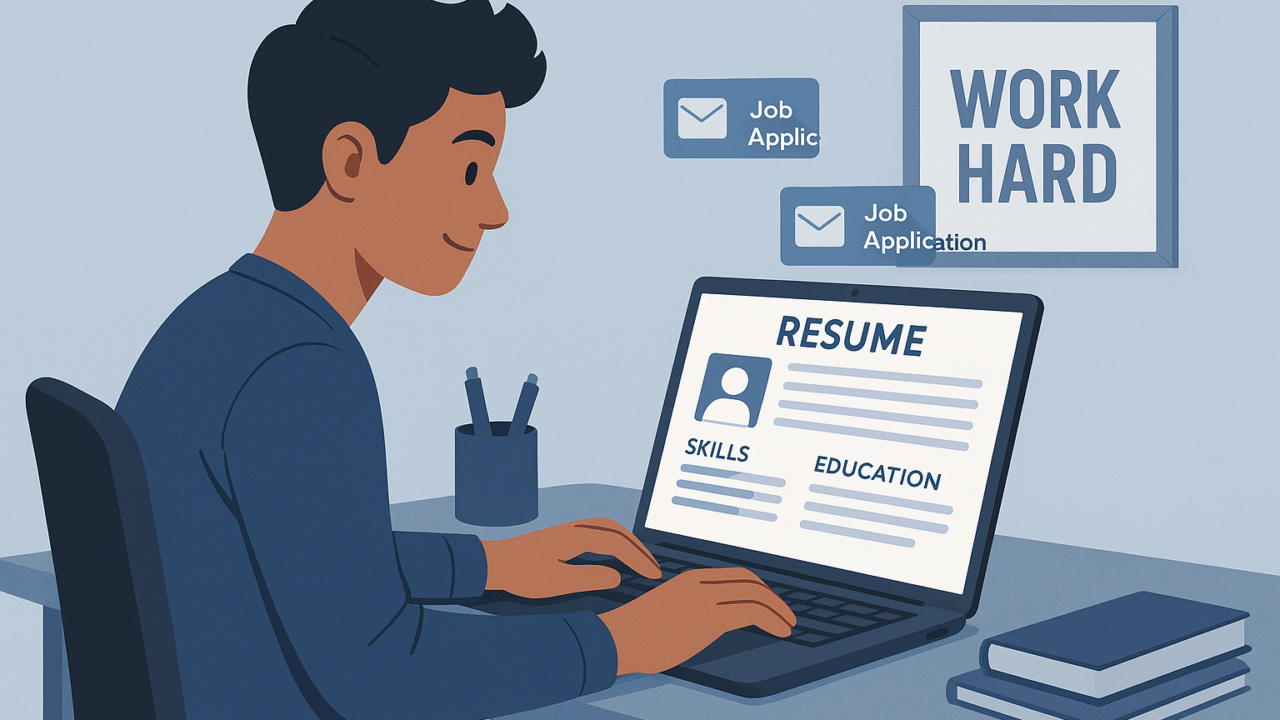Landing your first job without prior work experience may seem challenging, but a well-crafted resume can highlight your skills, education, and potential to impress employers. Even without traditional job history, you can showcase your strengths and increase your chances of getting hired.
This step-by-step guide will help entry-level job seekers create a compelling resume that stands out in today’s job market.
1. Start with a Strong Summary Statement
A well-written summary provides recruiters with a quick insight into who you are and what you bring to the table.
✅ Example of a Strong Summary for an Entry-Level Candidate:
“Recent Marketing graduate with strong research and analytical skills. Passionate about digital marketing, content creation, and social media strategy. Eager to apply my knowledge and creativity to drive brand growth and engagement.”
🚨 Mistake to Avoid: Writing a vague or generic objective like “Looking for a job to gain experience.” Instead, focus on what you can offer the employer.
2. Highlight Your Education & Relevant Coursework
Since you may not have much work experience, your education becomes one of your strongest assets.
✅ Include:
- Degree & Major (e.g., Bachelor of Business Administration, Marketing)
- University Name & Graduation Year
- Relevant Coursework (e.g., Digital Marketing, Business Analytics, Public Speaking)
- GPA (if above 3.5, otherwise omit)
- Certifications & Training (e.g., Google Analytics Certification, HubSpot Inbound Marketing)
🚨 Mistake to Avoid: Listing irrelevant coursework that doesn’t relate to the job.
3. Emphasize Transferable Skills
Even without job experience, you have valuable skills gained through education, volunteering, and personal projects.
✅ Examples of Transferable Skills:
- Communication Skills (e.g., writing, presentations, public speaking)
- Analytical Thinking (e.g., problem-solving, critical thinking)
- Technical Skills (e.g., Microsoft Office, Photoshop, coding)
- Project Management (e.g., organizing events, teamwork, leadership)
🚨 Mistake to Avoid: Listing generic soft skills without providing context or examples.
4. Add Internship, Volunteer Work, or Freelance Projects
Employers value real-world experience, even if it’s unpaid or informal.
✅ Examples of Alternative Experience:
- Internships: “Marketing Intern at XYZ Agency – Managed social media content and increased engagement by 20%.”
- Freelance Work: “Designed 5+ websites for local businesses using WordPress and SEO optimization.”
- Volunteering: “Organized fundraising events for a nonprofit, raising over $5,000.”
🚨 Mistake to Avoid: Leaving this section blank just because you haven’t had a traditional job. Showcase any work-related experience!
5. List Extracurricular Activities & Leadership Roles
Your college or community involvement can demonstrate leadership, teamwork, and dedication.
✅ Examples of Valuable Activities:
- Student Council Member – Led initiatives and organized events
- Debate Team Captain – Developed strong public speaking skills
- Tech Club Member – Built projects and collaborated on coding competitions
🚨 Mistake to Avoid: Listing irrelevant activities with no professional impact.
6. Keep Your Resume Format Clean & ATS-Friendly
Most recruiters use Applicant Tracking Systems (ATS) to scan resumes, so your format should be simple and keyword-optimized.
✅ Best Resume Practices:
- Use clear section headings (Work Experience, Education, Skills)
- Stick to professional fonts (Arial, Calibri, Times New Roman)
- Save as PDF or DOCX for easy reading
🚨 Mistake to Avoid: Using excessive graphics, images, or complicated designs that ATS cannot process.
7. Include a Strong Skills Section
Tailor your skills section to the job description by including relevant hard and soft skills.
✅ Example of a Well-Organized Skills Section:
🔹 Technical Skills: Microsoft Office, Canva, Google Analytics, SEO
🔹 Soft Skills: Communication, Problem-Solving, Team Collaboration
🔹 Languages: English (Fluent), Arabic (Intermediate), French (Basic)
🚨 Mistake to Avoid: Listing irrelevant skills just to fill space. Focus on what’s valuable to the employer.
Conclusion
A strong resume is possible—even without traditional work experience. By highlighting your education, transferable skills, volunteer work, and extracurricular activities, you can present yourself as a valuable candidate to potential employers.
🔹 Take Action Today! Update your resume with these tips and start applying for jobs with confidence.




